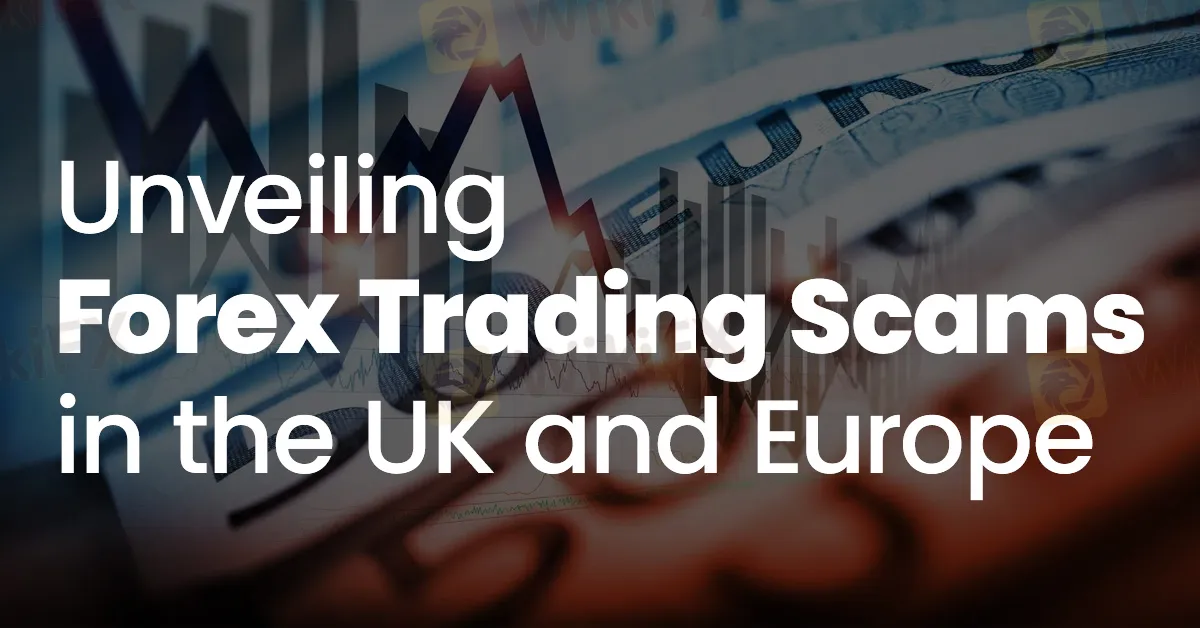简体中文
繁體中文
English
Pусский
日本語
ภาษาไทย
Tiếng Việt
Bahasa Indonesia
Español
हिन्दी
Filippiiniläinen
Français
Deutsch
Português
Türkçe
한국어
العربية
Navigating the Shadows: Unveiling Forex Trading Scams in the UK and Europe
Abstract:In this article, we will delve into the alarming prevalence of such scams, examining the key trends and shedding light on the measures in place to protect investors.

In the fast-paced world of foreign exchange trading, the allure of quick profits often overshadows the lurking dangers of scams. The United Kingdom and Europe, home to a robust financial landscape, have unfortunately not been immune to the rise of forex trading scams. In this article, we will delve into the alarming prevalence of such scams, examining the key trends and shedding light on the measures in place to protect investors.
The Landscape of Forex Trading Scams in the UK and Europe
Forex trading scams have become increasingly sophisticated, exploiting the vulnerabilities of unsuspecting investors. According to recent reports, the UK and Europe have witnessed a surge in fraudulent activities, with fake brokers, Ponzi schemes, and deceptive investment schemes preying on the dreams of wealth seekers.
Understanding the tactics employed by these scammers is crucial for investors looking to navigate the forex market safely. Fake brokers often create an illusion of legitimacy, enticing traders with promises of high returns and low risks. Ponzi schemes, on the other hand, rely on a constant influx of new investments to pay returns to earlier investors, creating a facade of profitability until the inevitable collapse.
Regulatory Measures Against Forex Scams
In response to the escalating threat of forex scams, regulatory bodies in the UK and Europe have intensified their efforts to protect investors. These measures aim to enhance transparency, tighten oversight, and empower authorities to take swift action against fraudulent entities.
Regulatory bodies such as the Financial Conduct Authority (FCA) in the UK and the European Securities and Markets Authority (ESMA) have implemented stringent regulations to curb the activities of unscrupulous actors. However, the evolving nature of forex scams requires a constant adaptation of regulatory frameworks to stay ahead of the game.
Notable Forex Scam Cases in the UK and Europe
Examining specific cases serves as a stark reminder of the real and devastating consequences of falling victim to forex scams. Instances of fake brokers vanishing with investors' funds and Ponzi schemes collapsing in a spectacular fashion highlight the need for heightened vigilance in the forex trading arena.
One recent case involved a fraudulent investment scheme that promised unprecedented returns, attracting investors from across Europe. When the scheme unraveled, it left a trail of financial ruin for those who had placed their trust in the deceptive promises.
Identifying and Avoiding Forex Trading Scams
To shield oneself from the perils of forex scams, it is imperative to recognize the warning signs and exercise due diligence. Red flags include unrealistically high returns, pressure tactics from brokers, and a lack of clear information about the company. Traders should conduct thorough research, verify the credentials of brokers, and seek advice from reputable sources.
This is where educational platforms like WikiFX can play a pivotal role. WikiFX offers a comprehensive database of brokers, providing crucial information about their regulatory status, user reviews, and any reported scams or fraudulent activities. Investors can access this valuable resource to make informed decisions and avoid falling prey to unscrupulous entities.
WikiFX: Your Guardian Against Forex Scams
WikiFX serves as a beacon of trust in the murky waters of forex trading. As a user-friendly platform, WikiFX empowers investors with the knowledge they need to make sound decisions. By offering a wealth of information on brokers, including regulatory status and user reviews, WikiFX enables traders to navigate the forex market with confidence.
To access WikiFX and benefit from its comprehensive database, visit www.wikifx.com and equip yourself with the tools needed to safeguard your investments.
In conclusion, the prevalence of forex trading scams in the UK and Europe underscores the importance of awareness, education, and regulatory diligence. As investors strive for financial success in the forex market, staying informed and utilizing resources like WikiFX can be the key to avoiding the pitfalls of scams and building a secure financial future.

Disclaimer:
The views in this article only represent the author's personal views, and do not constitute investment advice on this platform. This platform does not guarantee the accuracy, completeness and timeliness of the information in the article, and will not be liable for any loss caused by the use of or reliance on the information in the article.
Read more

Thinking of Investing? Read Must-Know Facts About Funding pips!
When you check the internet for Funding Pips, you'd be surprised to know it's filled with praise for Funding Pips but often lacks the real facts that traders need. Everything that seems too good to be true should always be verified first. It could be Fraud . So, we conducted research and collected several facts you must know about Funding Pips.

OctaFX Back in News: ED Attaches Assets Worth INR 134 Cr in Forex Scam Case
The Enforcement Directorate (ED) in Mumbai has attached assets worth around INR 131.45 crore. This included a luxury yacht and residential properties in Spain. Read this interesting story.

Truth About Angel One – Here’s What You Need to Know
Thinking about investing in Angel One? Wait! Know the essential things about the broker before Invest. It could be SCAM. Read, think, and invest .

He Thought He Earned RM4 Million, But It Was All a Scam
A retired teacher in Malaysia lost over RM838,000 after falling for a fake investment scheme that promised quick and high returns.
WikiFX Broker
Latest News
Global Brokers Vs. Indian Rules: Why They Struggle in India
Services Surveys Signal 'Expansion' In June, Inflation Fears Remain High
ASIC cancels AFS licences of Ipraxis and Downunder Insurance Services
CFD Brokers Face Dual Compliance Pressures Ahead of 2026: Australia and EU Tighten Rules
FxPro to Launch Crypto Trading Desk, Deepening Digital Asset Push
CFI Financial Group Becomes Official Online Trading Partner of Etihad Arena
Discover 5 Benefits of Trading with Trive FX Broker
Major Risks Associated with AuxiliumFX: You Need to Know
IPO market gets boost from Circle's 500% surge, sparking optimism that drought may be ending
Asia-Pacific markets trade mixed ahead of Trump's deadline for higher tariffs
Currency Calculator


